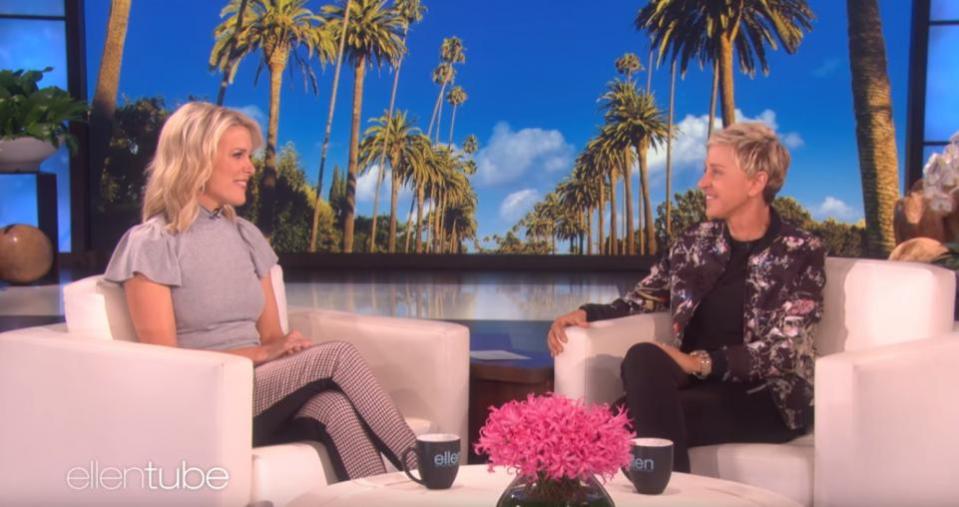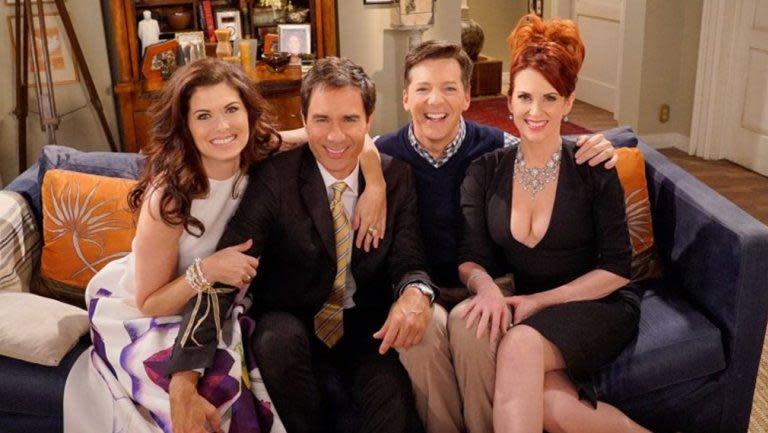Megyn Kelly's White Privilege Lets Her Avoid Politics
Former Fox News pundit Megyn Kelly attempted to shed her political background in her debut on September 25 as part of NBC's Today lineup, telling her audience: "The truth is I am kinda done with politics for now.... It’s gotten so dark, and I’m just, like, over." The statement was met with applause, and Kelly segued into an audience Q&A before welcoming her first guests: the entire cast of Will & Grace.
The central problem with Kelly's new brand is not that she's creating an apolitical "safe space" for viewers of any background. It's that removing herself from any political discussion is a privilege available almost exclusively to white women, and she hasn’t recognized that fact. Her breezy, attempting-to-be-relatable argument is not unique. White women in media across the political spectrum have joked recently about the emotional toll the news cycle takes on viewers.
Tina Fey, in a deeply ill-advised Saturday Night Live appearance in August, told viewers to unplug from the news, specifically regarding the neo-Nazi rally in Charlottesville, Virginia, and "eat their feelings" by devouring an entire sheetcake. "Sheetcaking," as Fey called her emotional escape method, is yet another example of humor afforded solely to Americans who aren't directly affected by the Trump administration—yet. It’s a lot harder to eat a Fey-style sheetcake and watch Kelly’s new morning show when you’ve lost your health insurance, or your parents are being deported, or you’ve lost your job in the military because of your gender identity, or armed protesters bearing swastikas are gathering in your neighborhood.
Of course, in asking viewers to follow her escapist route, Kelly also is denying them their political power and influence. In fact, it was white women who elected President Donald Trump; 53 percent of the demographic that includes Fey and Kelly who showed up to polls in 2016 voted for Trump. That means, if Trump is as ineffective as Kelly has suggested in the past, electing another president in 2020 won't come down to the same people of color who voted against him in 2016. That change will have to occur in Kelly's own demographic; but, as she told her audience on Monday, information regarding Trump won't be coming from her. She is, according to her opening monologue, neither responsible for nor actively involved in politics.
Kelly recently met with another white woman in media, Ellen DeGeneres, on her pre-NBC rebranding tour, and the two found themselves at odds regarding Trump. DeGeneres has struck a balance on her show since Trump's election, not engaging with the political news cycle in every episode, but making several well-timed statements about the current administration that make her political opinions clear.
While Kelly admitted that she would welcome the sitting president as a guest on her new show, DeGeneres made a rare political statement by saying he would not be welcome on The Ellen DeGeneres Show under any circumstances. "For me to have someone on the show, I have to at least admire them in some way," DeGeneres said on air. "And I can’t have someone that I feel is not only dangerous for the country—and for me personally as a gay woman—but to the world. He’s dividing all of us.... I just don’t want him on the show." Kelly did not respond to this statement.
It's not an impossible feat for a TV host to avoid politics in her daily discourse, then, focusing instead of entertainment news, as DeGeneres does, but perhaps because the former standup comic is a queer woman (she mentioned her sexuality while talking with Kelly), she's unable to fully disengage with the political world.

That's the problem with both Kelly and Fey; because Trump's policies have yet to threaten them directly, as wealthy, white, straight, cis-bodied women, they still have a conversational "out" that allows them the freedom to joke about many Americans who are anxious, and how discussing lighter fare and eating sheetcake can remedy the situation.
For a growing number of Americans, many of whom are undoubtedly a prospective part of Kelly's new demographic, the current climate is not as simple as choosing to "be political" or taking a momentary break. The way Kelly described politics in her morning show debut, the conversation about the president's statements on Twitter and the moves he makes in Washington just amount to a droning, depressing source of noise on which she and her studio audience can simply turn down the volume. That avoidance, whether Kelly realizes it or not, is a privileged white woman playing her hand, telling her new audience, "I don't have to pay attention to these updates and neither do you."
On paper, a talk show that avoids giving Trump a platform and covers primarily fluffy news might work, but only if the show's audience knows where their host falls on certain topics. That somewhat-apolitical conceit certainly already works with The Ellen DeGeneres Show, but only because DeGeneres's fans are familiar with her queer identity, and because she makes a point to invite a diverse array of guests and speak candidly with them about their concerns.
Kelly revealed her inability to contend with even the most basic identity politics when she invited the cast of Will & Grace onto her set for her debut episode. Perhaps she may have been able to cover the show as it once existed—a bouncy take on wealthy, white gay men in Manhattan—but showrunners Max Mutchnick and David Kohan have taken strides in the reboot to address the full range of queer concerns, including the experiences of transgender people, whom Trump targeted via Twitter in recent weeks. When questioned about how Will & Grace has matured to fit the times, star Debra Messing says, "Well, obviously we have more initials to catch up with. Really, it was just LGB...11 years ago.... We need to do stories with trans characters. We need to deal with gender identity." Clearly, the sitcom will have evolved from a basic take on gay, cis-bodied men when it premieres on NBC on September 28.

In trying to talk about the show apolitically, Kelly made an off-color joke about a Will & Grace superfan in the audience. “Is it true that you became a lawyer—and became gay—because of Will?" she asked, and the question was met with awkward laughter.
Time will tell if Kelly's rebranding attempt will satisfy a bipartisan audience, but given that she hasn't endeared herself to either the left or right with earnestness makes that scenario an unlikely one. She's also, disappointingly, falling in line with other media personalities who look like her, joining the ranks of wealthy white women who laugh off the news of the day because they can.
Related Articles


